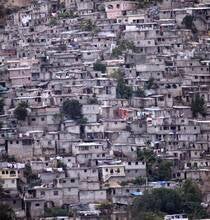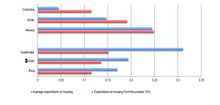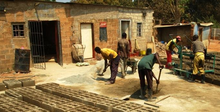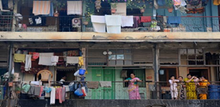By 2030, ensure access for all to adequate, safe and affordable housing and basic services and upgrade slums
Indicator 11.1.1: Proportion of urban population living in slums, informal settlements, or inadequate housing

As we turn the page on MDGs to SDGs, the unprecedented proliferation of slums and informal settlements, and a chronic lack of adequate housing, continues to be amongst the major challenges of urbanization. Slums, informal settlements and inadequate housing remain the visible manifestations of poverty and inequality in cities. Inadequate housing complements the measurement of slums, particularly in the developed world, in order not to leave anyone behind.
Available evidence shows that inadequate housing affects far more people in urban areas, despite being more acute in rural areas. Affordability is one of the seven housing adequacy criteria based on the OHCHR definition on the right to adequate housing. As affordability increasingly becomes a global crisis, with strong negative impact on the well-being of people and on the exacerbation of urban inequality, it has been selected as the most suitable measurement of adequacy of housing.
Based on the existing method and data through the Urban Indicators Program (1996-2006), affordability is measured as the net monthly expenditure on housing cost that exceed 30% of the total monthly income of the household. Inadequate housing affects women disproportionately and manifests in the form of the number of women-headed households in urban poverty. There are other hurdles to women in obtaining decent shelter such as laws and practices that do not support women’s equal rights to land and housing.
Slum upgrading and adequate housing have an equalizing impact in the distribution of prosperity
- In 16 cities in Latin America, the poorest people devoted 21% of their expenditure to housing, and rich people 28%. This minimal difference denotes strong inequalities.
- At least, 330 million households are financially stretched by housing costs.
- In 2015, 30% of the population still lives in slum-like conditions. The highest prevalence of slums in the world is found in Sub-Saharan Africa (55%)
Our Work


Participatory Slum Upgrading Programme (PSUP)
PSUP aims at improving the living conditions of slum dwellers by enhancing the ability of relevant urban actors - from concerned authorities to slum dwellers themselves - to collectively understand and tackle the multi-dimensional nature of the slum challenge and to identify and implement appropriate and sustainable responses, devising the pro-poor urban policies and regulations, the city-wide strategies and the community-led initiatives that will integrate slum areas into the larger urban fabric and thus realise the potential of the people living in slums. Read more,..
Global Housing Strategy (GHS)
We work with UN member states toward integrated, sustainable and inclusive national housing policies and strategies within the context of UN-Habitat’s “Housing at the Center” approach that place housing at the center of cities, at the center of national urban policy, and at the center of the lives of people, in particular slum dwellers and other groups in situations of vulnerability.
Migration and Inclusive Cities in the Arab Region
The project establishes a baseline understanding on the impact of displaced populations in the Arab region on informal areas. The project aims to sensitized and improve knowledge of local authorities on data and needs relating to migrant communities in their cities and raise awareness of local governments, municipalities and city professionals’ knowledge on Best Practices in addressing significant gaps that exist between “migration policies” on national level and migrants’ urban experiences at the local level enhanced.
Neighborhood Upgrading in Cities
The project aims at improving the living conditions of urban dwellers in Tripoli and Tyr by improving the access to basic services. The project aims at strengthening local capacities and enhance urban knowledge of decision-makers and community representatives to implement pro-poor policies and plans at the city level and improve access to basic services for poor urban dwellers through the implementation of upgrading projects in vulnerable neighborhoods of the two cities.




